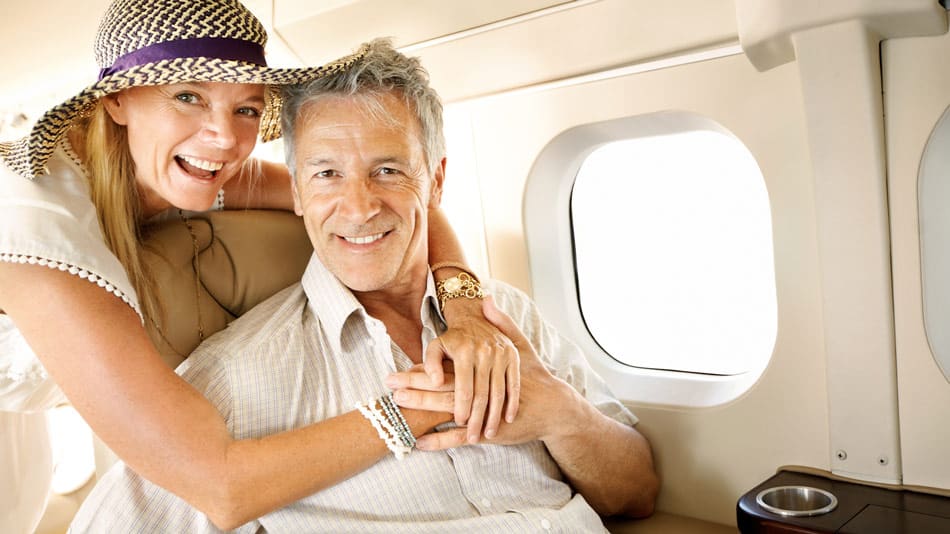
Can you fly after cataract surgery?
If you’re considering when you can fly after cataract surgery, you should note that the nature of recovery may vary for everyone. Premium cataract surgery offers a solution if your eyes have clouded with cataracts and your vision and your quality of life have declined.
This is why you should allow yourself time to recover after your eye surgery and not over-exert yourself too quickly after treatment. Read below to find out exactly when the best time to take to the skies is.
The ideal timeframe to fly again
As a general guideline, we advise to abstain from flying during the recovery period ranging from 24 hours to 48 hours1https://www.aao.org/eye-health/tips-prevention/can-i-fly-with-this-eye after cataract surgery. Changes in air pressure during takeoff and landing can cause potential discomfort, which is why you should consider this precaution.
If you urgently need to fly within the first week following cataract- removal surgery, consult with your surgeon or another medical professional beforehand to check if you are in good enough health. If they approve the travel plans, you must adhere to their precautions. This includes frequently using lubricating eye drops, wearing sunglasses to protect your eyes from bright light or advancing dry eye symptoms. You should also refrain from rubbing or touching your eyes too to ensure a smooth healing process.
Some extra considerations if you do choose to fly soon
- In addition to the precautions mentioned above, it’s crucial to consider the potential impact of air travel on your eyes and overall well-being after cataract surgery. Aeroplane cabins are often dry, and the recycled air can contribute to increased dryness of the eyes. Therefore, it’s advisable to stay hydrated during the flight by drinking plenty of water and using lubricating eye drops as recommended by your surgeon.
- Furthermore, using electronic devices such as smartphones or tablets during the flight may strain your eyes. You should take regular breaks, blink frequently, and follow any specific guidelines provided by your eye surgeon to prevent unnecessary stress on your eyes.
- As you plan your post-surgery travel, remember that each individual’s recovery process is unique. Factors such as age, overall health, and the specific details of your surgery may influence how quickly you can resume normal activities, including air travel. Therefore, maintaining open communication with your surgeon and following their guidance is important to ensure a smooth recovery and the best possible outcome for your vision.
By staying well-informed and taking the precautions advised by your cataract surgeon, you can facilitate a successful recovery and relish the benefits of improved vision. If you’re ready to free yourself from clouded vision and choose premium cataract surgery, call us on 08 7082 2066 or email us at info@ivisiolaser.com.au. A referral from your GP or optometrist will be required to book in for your assessment.
Find out if you are suitable for vision correction
Not everyone is eligible for vision correction surgery.
Find out if you could benefit from this life changing surgery by taking the quick self-suitability quiz below:
Our most popular procedures

Hi, I’m Dr Aanchal Gupta, your laser and cataract surgeon in Adelaide
Over the past 10 years, I’ve had the joy of helping thousands of patients of all ages gain clear vision and freedom from glasses and contact lenses.
Laser eye surgery is a skill. Performing vision correction at a world-class standard hinges upon the expertise of your surgeon and their access to state-of-the-art tools.
I understand that getting eye surgery is a serious decision. Your eyes are unique and you should demand a custom solution tailored to your needs, lifestyle and goals. That’s why we offer a free appointment so we can meet and I can take the time to answer your questions and talk through any concerns you have.
I am passionate about helping patients transform their lives. I look forward to spending time with you at our gorgeous eye clinic in the heart of Adelaide to see whether you could gain exceptional vision without the need for glasses or contacts.
Dr Aanchal Gupta
MBBS, M.Med. (Ophth. Sci.), Grad. Dip. (Refract. Surg.), FRANZCO
Expert Laser Eye and Cataract Surgeon
